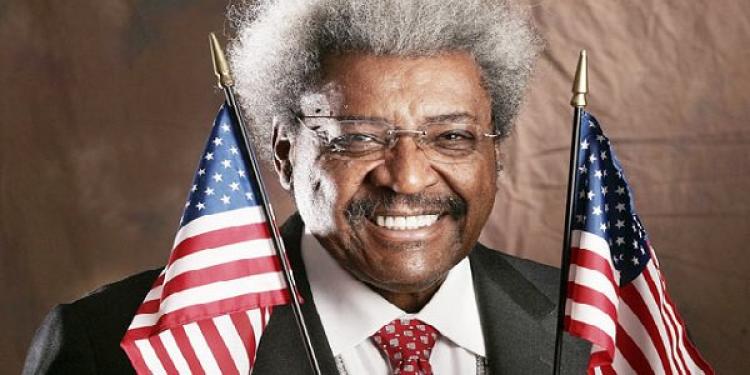Don King and his Collection of Lawsuits (part 1)
Posted: May 7, 2015
Updated: October 6, 2017

The unscrupulous boxing promoter has amassed quite a legacy.
Don King is a legendary boxing promoter who has been known for promoting some of the most famous bouts in history such as “Rumble in the Jungle” and “The Thrilla in Manila.” The path that led to King’s $200 million earned in his career has been paved in obscurity and at times indecency. The guy raised in Cleveland who learned to set up a gambling ring inconsistent with US gambling laws has come far in life.
• Don King has made $200 million in the course of his career.
• King pled the Fifth Amendment in his association with Mob boss John Gotti.
• Holmes was retired for two years when King offered him a bout with Tyson.
Some of King’s reported actions may lead one to believe he hasn’t changed. King shot and killed a man in 1954 and served time in prison only after beating an employee on the street who owed him $600. King supposedly put a hit on Meldrick Taylor and has been implicated in other crimes. King pled the Fifth Amendment in his association with Mob boss John Gotti. Many boxers have sued King for mishandling their careers.
Don King’s dealing with Muhammad Ali
Heavyweight Champion Muhammad Ali and Don King have been long associates. It was Ali who convinced Don King to pursue promotion which led to some of Ali’s largest bouts. In 1982, Muhammad Ali sued King for underpaying him $1.1 million from the $8 million guaranteed for his bout with Larry Holmes. Ali made an attempt for a fourth comeback purely for financial purposes.
Larry Holmes didn’t want to fight with Ali since he knew that Ali was incapable of providing any challenge. Unfortunately this fight coincided with the first physical signs of Ali’s struggle with Parkinson’s syndrome, a debilitating nervous system disorder caused by repeated head injury. Ali was approved by the privatized Mayo Clinic to fight in the bout with Holmes. The fight was considered a major contribution to Ali’s ailment.

Known in US gambling news, King requested the assistance of Jeremiah Shabazz, an old friend of Ali’s. Entering Ali’s hospital room while he suffering from failing health and made an offer to him. On the condition of signing a document dropping charges, Ali was handed a suitcase containing $50,000 in cash. Even more absurd was the condition in the document that said King would have rights to promote Ali’s future fights.
Unfortunately, what King did to Ali would set a precedent for a practice King would continue in the 1970’s and 1980’s. Ali would later feel less hostility towards King. Perhaps as they approached old age, the two developed an understanding of how the fight business was from the beginning and King simply acted in a way most promoters did throughout the history of the sport.
Larry Holmes’ never ending partnership with King

Larry Holmes has also claimed to have $10 million in fight purses cheated from him by King. This also included 25% of his fight purses that were taken by King as his “undisclosed” manager. Some of the more major withholdings by King included Holmes receiving $150,000 out of $500,000 owed to him for his fight with Ken Norton. In addition, Holmes received $50,000 for $200,000 for his bout with Earnie Shavers.
Having been given partial purses from bouts with Ali, Randall Cobb and Leon Spinks, Holmes finally sued King for underpaying him by over $2 million from his bout with Gerry Cooney. Holmes also sued King for taking a finder’s fee of $300,000 from his purse against Mike Tyson. Holmes had been retired for two years, when King approached him with an offer to fight Tyson.
According to Holmes, King came knocking at his door at night and said he wanted Holmes to fight. After saying he was retired, King said “I’ve got a fight for you and you can beat this guy.” Once King mentioned Mike Tyson, Holmes said he couldn’t beat Tyson. King’s reply was “yeah, but I can get you $3.5 million” and Holmes replied by saying “Ok, where’s Mike at?” Vegas and online sportsbooks in the US alike would have said otherwise.
Holmes eventually reached a settlement with King for $150,000 and a legal pledge to not give negative publicity towards King. Holmes later in life gave credit to King for getting him where he is today and preparing him for the championship. Holmes claimed that King although he took a lot of money, made a lot of money for him as well and brought him a championship.











